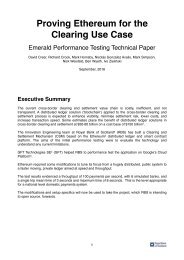Bitcoin and Cryptocurrency Technologies
1Qqc4BN
1Qqc4BN
You also want an ePaper? Increase the reach of your titles
YUMPU automatically turns print PDFs into web optimized ePapers that Google loves.
inform someone that you’re going to be using a particular name. If you want a new identity, you can<br />
just generate one at any time, <strong>and</strong> you can make as many as you want. If you prefer to be known by<br />
five different names, no problem! Just make five identities. If you want to be somewhat anonymous<br />
for a while, you can make a new identity, use it just for a little while, <strong>and</strong> then throw it away. All of<br />
these things are possible with decentralized identity management, <strong>and</strong> this is the way <strong>Bitcoin</strong>, in fact,<br />
does identity. These identities are called addresses, in <strong>Bitcoin</strong> jargon. You’ll frequently hear the term<br />
address used in the context of <strong>Bitcoin</strong> <strong>and</strong> cryptocurrencies, <strong>and</strong> that’s really just a hash of a public<br />
key. It’s an identity that someone made up out of thin air, as part of this decentralized identity<br />
management scheme.<br />
Sidebar.The idea that you can generate an identity without a centralized authority may seem<br />
counterintuitive. After all, if someone else gets lucky <strong>and</strong> generates the same key as you can’t they<br />
steal your bitcoins?<br />
The answer is that the probability of someone else generating the same 256‐bit key as you is so<br />
small that we don’t have to worry about it in practice. We are for all intents <strong>and</strong> purposes<br />
guaranteed that it will never happen.<br />
More generally, in contrast to beginners’ intuition that probabilistic systems are unpredictable <strong>and</strong><br />
hard to reason about, often the opposite is true — the theory of statistics allows us to precisely<br />
quantify the chances of events we’re interested in <strong>and</strong> make confident assertions about the<br />
behavior of such systems.<br />
But there’s a subtlety: the probabilistic guarantee is true only when keys are generated at r<strong>and</strong>om.<br />
The generation of r<strong>and</strong>omness is often a weak point in real systems. If two users’ computers use<br />
the same source of r<strong>and</strong>omness or use predictable r<strong>and</strong>omness, then the theoretical guarantees no<br />
longer apply. So it is crucial to use a good source of r<strong>and</strong>omness when generating keys to ensure<br />
that practical guarantees match the theoretical ones.<br />
On first glance, it may seems that decentralized identity management leads to great anonymity <strong>and</strong><br />
privacy. After all, you can create a r<strong>and</strong>om‐looking identity all by yourself without telling anyone your<br />
real‐world identity. But it’s not that simple. Over time, the identity that you create makes a series of<br />
statements. People see these statements <strong>and</strong> thus know that whoever owns this identity has done a<br />
certain series of actions. They can start to connect the dots, using this series of actions to infer things<br />
about your real‐world identity. An observer can link together these things over time, <strong>and</strong> make<br />
inferences that lead them to conclusions such as, “Gee, this person is acting a lot like Joe. Maybe this<br />
person is Joe.”<br />
In other words, in <strong>Bitcoin</strong> you don’t need to explicitly register or reveal your real‐world identity, but<br />
the pattern of your behavior might itself be identifying. This is the fundamental privacy question in a<br />
cryptocurrency like <strong>Bitcoin</strong>, <strong>and</strong> indeed we’ll devote the entirety of Chapter 6 to it.<br />
42









